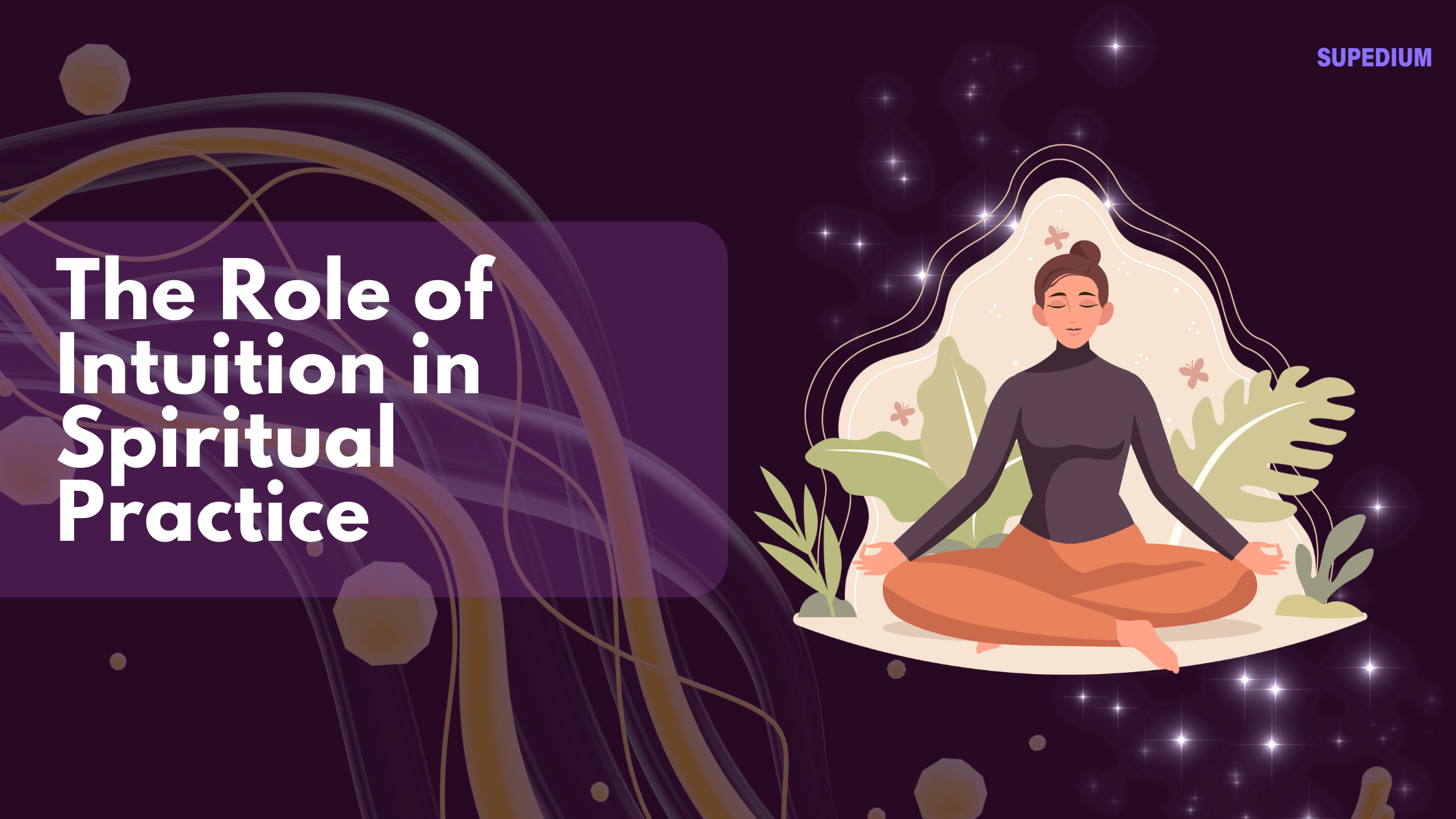Table of Contents
![]()
Intuition, often described as a form of immediate understanding or insight that comes without the need for conscious reasoning, plays a significant role in many spiritual practices. This article explores the multifaceted relationship between intuition and spirituality, examining its historical context, its nature, its application in spiritual practices, and the various perspectives on its significance.
Introduction
Definition of Intuition
Intuition is commonly understood as the ability to understand or know something immediately, without the need for conscious reasoning. Psychologically, it is often seen as a form of unconscious processing where the brain synthesizes information rapidly to produce a gut feeling or insight.
Overview of Spiritual Practice
Spiritual practice encompasses a variety of activities and disciplines aimed at personal and spiritual growth, understanding, and connection with the divine or the transcendent. These practices can range from meditation and prayer to rituals and mystical experiences, and they often aim to foster a deeper sense of purpose and connection.
Importance of Intuition in Spiritual Context
In many spiritual traditions, intuition is regarded as a vital tool for personal guidance and spiritual insight. It is seen as a way to access deeper truths and divine wisdom that are not always available through rational thought alone.
Historical and Cultural Perspectives
Intuition in Ancient Spiritual Traditions
Intuition has been a part of spiritual practices across various ancient traditions. In Eastern religions such as Buddhism and Taoism, intuition is often associated with an innate understanding of the nature of reality and the self. For example, in Zen Buddhism, practitioners are encouraged to experience reality directly through meditation and mindfulness, bypassing analytical thought and accessing intuitive knowledge.
In Western mysticism, traditions like Gnosticism and Hermeticism also recognize the role of intuitive insight. Mystics and seekers in these traditions often relied on inner revelations and direct experiences of the divine, which they described as intuitive knowledge.
Modern Interpretations of Intuition in Spirituality
In contemporary spiritual movements, intuition continues to be highly valued. New Age spirituality, for example, places a strong emphasis on intuitive practices such as psychic readings and channeling. Modern psychology and neuroscience have also contributed to understanding intuition, suggesting that it is a complex interplay of cognitive processes and emotional states.
The Nature of Intuition
Cognitive Science of Intuition
From a cognitive science perspective, intuition involves the brain’s ability to process information quickly and subconsciously. This process, often referred to as “implicit knowledge,” allows individuals to make decisions or understand situations without deliberate analysis. The brain’s intuitive responses are shaped by past experiences and learned patterns, which contribute to the feeling of knowing something instinctively.
Intuition as a Spiritual Faculty
In spiritual contexts, intuition is often described as a form of inner knowing or direct perception of spiritual truths. Unlike rational thought, which relies on logical reasoning and evidence, intuition is seen as a more direct form of understanding that connects individuals with deeper spiritual realities. This form of knowing is typically characterized by a sense of clarity and certainty that transcends intellectual understanding.
Intuition in Different Spiritual Practices
Meditation and Mindfulness
Meditation and mindfulness practices are central to many spiritual traditions and are often used to cultivate intuition. Through techniques such as focused attention and awareness, practitioners learn to quiet the mind and become more attuned to their inner experiences. In Buddhist and Hindu traditions, meditation is used to access deeper layers of consciousness and intuitive insights, often leading to profound spiritual realizations.
Rituals and Ceremonies
Intuitive insights can also emerge during spiritual rituals and ceremonies. In various religious practices, rituals are designed to connect participants with divine forces or spiritual realms, and intuition can play a key role in interpreting the meaning and significance of these experiences. For instance, during shamanic ceremonies, practitioners may rely on intuitive guidance to navigate spiritual journeys and provide healing.
Mysticism and Contemplative Practices
Mystics and contemplatives often emphasize the importance of intuition in their spiritual experiences. Mystical experiences, characterized by direct encounters with the divine or transcendent, are frequently described as intuitive in nature. Historical figures like Rumi and Teresa of Ávila spoke of their profound spiritual insights as coming from a place beyond rational understanding, highlighting the role of intuition in their mystical experiences.
Developing and Enhancing Intuition
Techniques and Exercises
There are various techniques and exercises designed to enhance intuitive abilities. Practices such as journaling, reflective exercises, and mindfulness can help individuals become more attuned to their intuitive insights. Many spiritual traditions offer specific practices to develop intuition, such as divination methods in astrology or tarot, which are used to gain intuitive insights into personal situations.
Challenges and Obstacles
Despite its potential, intuition can be challenging to develop and trust. Common obstacles include skepticism, self-doubt, and the tendency to overanalyze. Balancing intuitive insights with rational thought is crucial, as relying solely on intuition without critical evaluation can lead to misguided decisions.
Practical Applications of Intuition in Spiritual Life
Decision-Making and Guidance
Intuition can play a crucial role in personal decision-making and spiritual guidance. Many individuals use their intuitive sense to navigate life choices, such as selecting a spiritual path or making significant life decisions. Intuition often provides a sense of clarity and direction that complements rational analysis.
Healing and Transformation
Intuitive approaches are also used in spiritual healing and transformation. Practices such as energy healing or intuitive counseling rely on the practitioner’s ability to sense and interpret intuitive information to facilitate healing processes. Personal stories and case studies often highlight how intuitive insights can lead to significant personal growth and transformation.
Case Studies and Personal Accounts
Individual Experiences
Personal accounts and testimonials from practitioners of various spiritual paths provide valuable insights into the role of intuition in spiritual practice. These stories often illustrate how intuitive insights have guided individuals through personal challenges and spiritual quests, providing a deeper understanding of their experiences.
Notable Figures
Historical and contemporary spiritual figures known for their intuitive insights offer additional perspectives on the role of intuition. Figures such as Edgar Cayce, known for his psychic readings, and modern spiritual teachers who emphasize intuitive practices in their teachings, demonstrate how intuition can influence spiritual contributions and understanding.
Criticisms and Controversies
Skeptical Perspectives
Skeptical viewpoints often question the validity and reliability of intuition in spiritual practice. Critics argue that intuitive insights can be influenced by cognitive biases and emotional states, leading to potentially unreliable or subjective experiences. This skepticism emphasizes the need for a balanced approach that incorporates both intuitive and rational perspectives.
Balancing Intuition and Rationality
Integrating intuition with rational thought is essential for a well-rounded spiritual practice. Acknowledging the value of intuitive insights while maintaining critical thinking helps ensure that spiritual practices are grounded and effective. This balance allows individuals to benefit from both intuitive and analytical approaches in their spiritual journey.
Conclusion
Summary of Key Points
Intuition plays a significant role in various aspects of spiritual practice, from meditation and rituals to mystical experiences and personal guidance. Its ability to provide immediate and profound insights makes it a valuable tool in spiritual growth and understanding. By exploring its historical, cultural, and practical dimensions, we gain a deeper appreciation of how intuition contributes to the richness of spiritual practice.
Future Directions
Future research and exploration in the field of intuition and spirituality may offer new insights into how intuitive processes can be better understood and utilized. Continued investigation into the interplay between intuition and rational thought can enhance our understanding of spiritual experiences and practices.
Share This





Be the first to comment